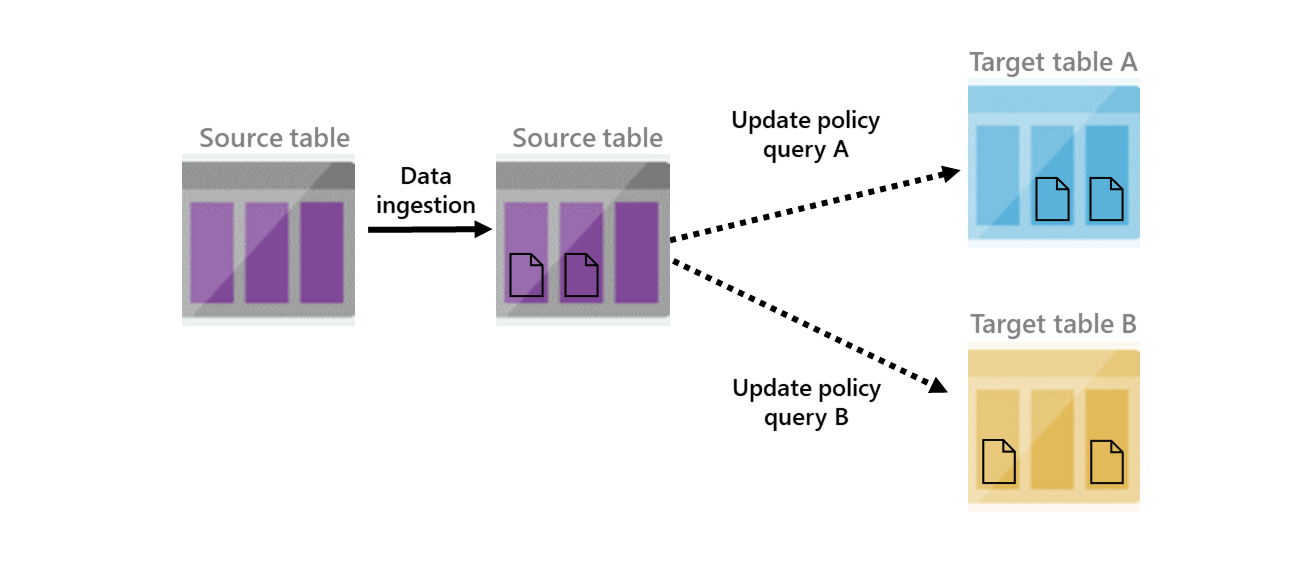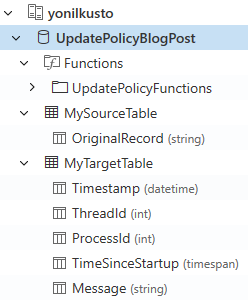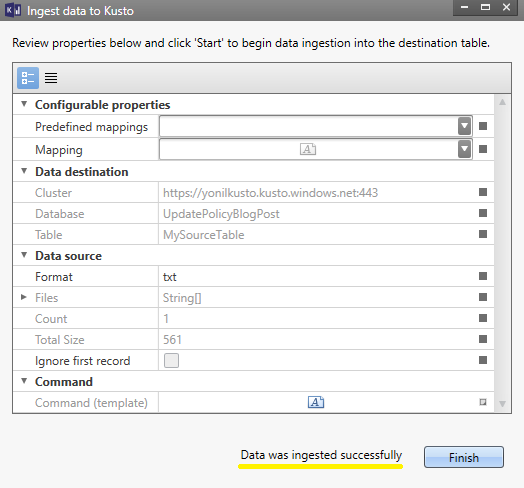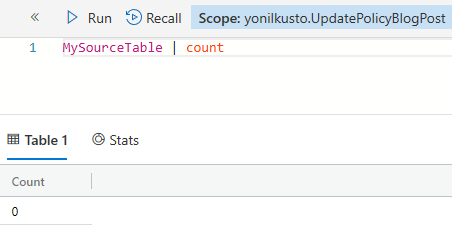Update policies for ELT in Kusto
Last modified: 11/08/2018
Kusto is super fast and efficient in getting your data ingested (, and then queried).
It’s usually recommended that your data is formatted to begin with, in either of the supported data formats, with CSV being the superior choice, in terms of both the clear definition of the format, as well the best performance at ingestion time.
In some cases, however, you have no control over the format of the data, but you still want to store it an efficient manner. In other cases, you may want to enrich the data as it gets ingested into Kusto (e.g. by joining the new records with a static dimension table which is already in your Kusto database). For both of these cases, using an update policy is a very common and powerful practice.
In this post, I will demonstrate how you can leverage an update policy, to take data which is ‘structured’ in a non-standard format, and restructure it at ingestion time, so that your queries will end up being much more efficient - You will pay a slight (usually negligible) overhead for manipulating the data at ingestion time, however you will gain a lot in the efficiency of all the queries which will run against your data set.

The source data
The source data in this example will look as follows:
(This is by no means a recommendation for how you should format your data/logs. Quite the contrary)
[2018-10-25 04:24:31.1234567Z] [ThreadId:1364] [ProcessId:771] TimeSinceStartup: 0.00:15:12.345 Message: Starting. All systems go.
[2018-10-25 04:26:31.1234567Z] [ThreadId:1364] [ProcessId:771] TimeSinceStartup: 0.00:17:12.345 Message: All components initialized successfully.
...
[2018-10-25 08:18:31.1234567Z] [ThreadId:8945] [ProcessId:598] TimeSinceStartup: 3.14:10:15.123 Message: Shutting down. Thanks for flying.
[2018-10-25 08:19:31.1234567Z] [ThreadId:8945] [ProcessId:598] TimeSinceStartup: 3.14:11:15.123 Message: Shutdown sequence complete. See ya.
As you can see above, each line is a single record, which includes a timestamp, and a few other fields of different types - numerals, strings, and timespans.
I could, theoretically, ingest everything into a single column in a Kusto table, then use Kusto’s strong query capabilities to parse all records at query time. However, as my data grows and becomes Big Data, query performance will degrade, regardless of the fact it’ll make exploring the data and working with it a little less “natural”.
The desired schema
It’s quite simple to derive a schema from the data above. Fortunately - it’s also very simple to parse it into that schema using Kusto’s query language (in this case - using parse operator):
Running this:
datatable(OriginalRecord:string)
[
'[2018-10-25 04:24:31.1234567Z] [ThreadId:1364] [ProcessId:771] TimeSinceStartup: 0.00:15:12.345 Message: Starting. All systems go.',
'[2018-10-25 04:26:31.1234567Z] [ThreadId:1364] [ProcessId:771] TimeSinceStartup: 0.00:17:12.345 Message: All components initialized successfully.',
'[2018-10-25 08:18:31.1234567Z] [ThreadId:8945] [ProcessId:598] TimeSinceStartup: 3.14:10:15.123 Message: Shutting down. Thanks for flying.',
'[2018-10-25 08:19:31.1234567Z] [ThreadId:8945] [ProcessId:598] TimeSinceStartup: 3.14:11:15.123 Message: Shutdown sequence complete. See ya.',
]
| parse OriginalRecord with "[" Timestamp:datetime "] [ThreadId:" ThreadId:int "] [ProcessId:" ProcessId:int "] TimeSinceStartup: " TimeSinceStartup:timespan " Message: " Message:string
| project-away OriginalRecord
Yields the following output:
| Timestamp | ThreadId | ProcessId | TimeSinceStartup | Message |
|---|---|---|---|---|
| 2018-10-25 04:24:31.1234567 | 1364 | 771 | 00:15:12.3450000 | Starting. All systems go. |
| 2018-10-25 04:26:31.1234567 | 1364 | 771 | 00:17:12.3450000 | All components initialized successfully. |
| 2018-10-25 08:18:31.1234567 | 8945 | 598 | 3.14:10:15.1230000 | Shutting down. Thanks for flying. |
| 2018-10-25 08:19:31.1234567 | 8945 | 598 | 3.14:11:15.1230000 | Shutdown sequence complete. See ya. |
We can actually go ahead and store this as a function in our database, as we’re going to use it soon:
.create function
with (docstring = 'Used in the update policy blog post', folder = 'UpdatePolicyFunctions')
ExtractMyLogs()
{
MySourceTable
| parse OriginalRecord with "[" Timestamp:datetime "] [ThreadId:" ThreadId:int "] [ProcessId:" ProcessId:int "] TimeSinceStartup: " TimeSinceStartup:timespan " Message: " Message:string
| project-away OriginalRecord
}
Great! Now, how can we use this function to process the data as it gets ingested?
Setting up the update policy
I will setup 2 tables in my Kusto database:
- The source table - This table will have a single string-typed column, into which I will ingest the source data, as-is.
- The target table - This table will have my desired schema. This is the table I define the update policy on.
Each time records get ingested into my source table, the query I define in my update policy will run on them (and only them - other records in my source table aren’t visible to the update policy when it runs), and the results of the query will be appended to my target table.
Simple, right? Let’s do it!
Creating the source table
As mentioned before, we’re going to put everything in a single string-typed column:
.create table MySourceTable (OriginalRecord:string)
Creating the target table
I can use either of the following options:
Explicitly defining the schema:
.create table MyTargetTable (Timestamp:datetime, ThreadId:int, ProcessId:int, TimeSinceStartup:timespan, Message:string)
Or - using the query to define the schema for me:
Using a .set command, I can create a table with the output schema of my query (this can help me verify my query actually creates the desired schema):
.set MyTargetTable <|
ExtractMyLogs()
| limit 0
Note: the | limit 0 suffix is meant to make sure the command actually appends no records to the target table
Defining the update policy
Now that we have all the “building blocks” (source table, target table, function for running at ingestion time), we can define the policy:
.alter table MyTargetTable policy update
@'[{ "IsEnabled": true, "Source": "MySourceTable", "Query": "ExtractMyLogs()", "IsTransactional": false, "PropagateIngestionProperties": false}]'
Transactional or not
Defining your update policy as transactional (by having IsTransactional set to true) will help in guaranteeing consistency between the data in the source table and in the target table. Doing so, however, comes with a risk that if your policy is defined incorrectly, data will not be ingested neither to the source table nor to the target table.
- An example for such a case can be a mismatch between the output schema of your query and the target table, caused, for example, by dropping (accidentally, or not) a column from the target table, or by altering the function so that its output schema is altered as well.
Propagating ingestion properties
If you’re specifying ingestion properties, such as extent tags and/or creation time as part of your ingestion (see other blog post as well), you can easily have them propagate to the extents (data shards) created in the target table, and not just apply to the extents created in the source table - Simply define your update policy with PropagateIngestionProperties set to true.
Retaining the data in its original form (or not)
In some cases, depending on which purpose your update policy serves, you may want to retain the data in its original format for other use cases. If youre have different flows with different requirements consuming the data in both tables, you may want to consider setting retention policies and/or caching policies on both the source and target tables, and define them according to your use case.
In other cases (like in the example in this blog post), the data in its original format has no value to us, and being cost-aware - we can simply define that it shouldn’t be retained at all, once ingestion completes. This can be achieved by:
- Defining the update policy with
IsTransactionalset totrue. - Defining the retention policy on the source table to have
0as itsSoftDeletePeriod.- This can be achieved by running the following command:
.alter-merge table MySourceTable policy retention softdelete = 0s
- This can be achieved by running the following command:
With these defined, the data in its original format never becomes visible to any query (excluding the query which is run as part of the update policy), and does not get persisted on the cluster’s nodes nor in persistent storage. Thus, this also serves better performance at ingestion time.
See it in action
Finally, I will ingest a sample file, to show you how it all works together. For doing so, I’ll be using Kusto.Explorer’s feature for easily importing a local file.
The file I will ingest is called sample.txt and has the following content (total of 4 records):
[2018-10-25 04:24:31.1234567Z] [ThreadId:1364] [ProcessId:771] TimeSinceStartup: 0.00:15:12.345 Message: Starting. All systems go.
[2018-10-25 04:26:31.1234567Z] [ThreadId:1364] [ProcessId:771] TimeSinceStartup: 0.00:17:12.345 Message: All components initialized successfully.
[2018-10-25 08:18:31.1234567Z] [ThreadId:8945] [ProcessId:598] TimeSinceStartup: 3.14:10:15.123 Message: Shutting down. Thanks for flying.
[2018-10-25 08:19:31.1234567Z] [ThreadId:8945] [ProcessId:598] TimeSinceStartup: 3.14:11:15.123 Message: Shutdown sequence complete. See ya.
I’ve created a cluster named yonilkusto and a database named UpdatePolicyBlogPost, and in it I’ve created (as explained above):
MySourceTable- the source table.MyTargetTable- the target tableExtractMyLogs()- the function for parsing the data inMySourceTable, the output of which will be appended toMyTargetTable.

I’ve chosen to set my update policy with IsTransactional = true:

I’ve also chosen to have the original records not retained in the source table (by setting a retention policy with 0 as its SoftDeletePeriod on it):

Now, I will ingest the sample.txt file:

And, voila - I can see that:
-
The source table has no records (as expected)

-
The target table has 4 records parsed into my 5 strongly-typed columns:

Our work here is done. Now - go ahead and try it out yourself!